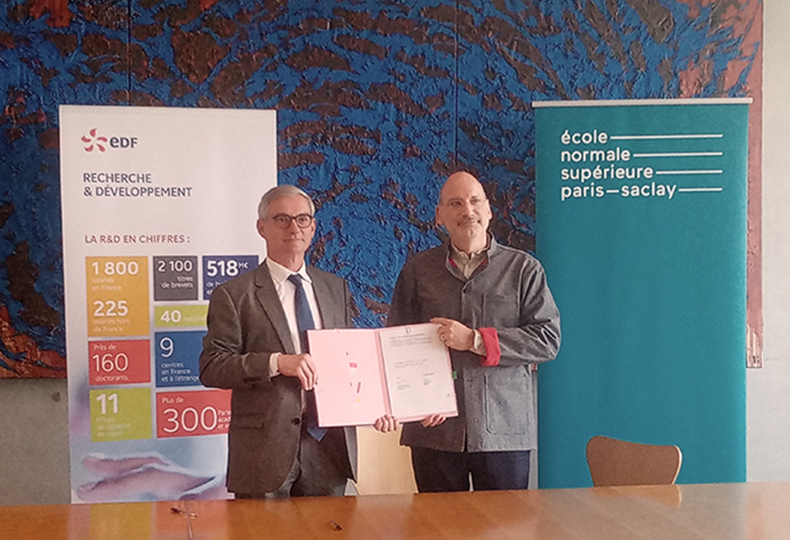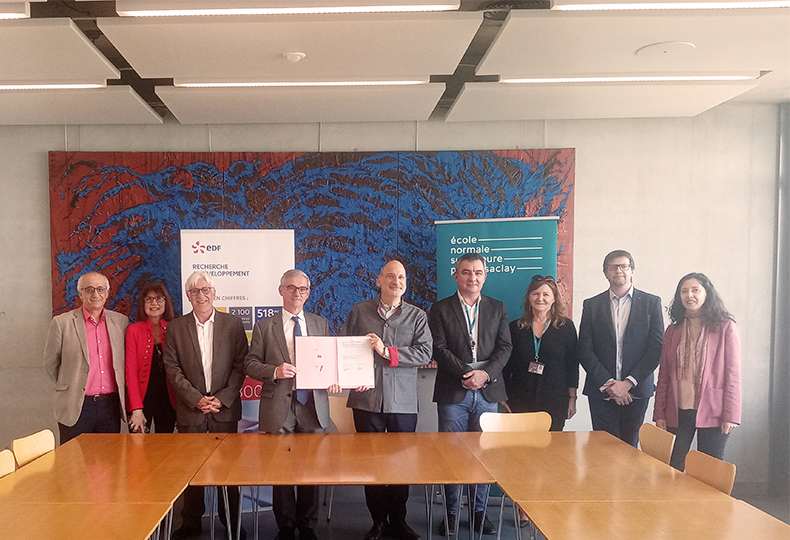Acceleration of the cooperation between ENS Paris-Saclay and EDF

Collaboration on energy transition
EDF and ENS Paris-Saclay sign a cooperation agreement to extend their collaboration in the field of energy transition.
The research programme "Contribution to the technological and societal challenges of energy production, transport and storage infrastructures" involves 9 laboratories at the School.
The areas of collaboration include the realisation of joint research projects, the animation of a scientific community around energy with participation in dissemination and exchange activities (seminars, conferences...), and continuous training aimed at the personnel of energy companies to increase their skills and expertise notably in the field of innovation.
Building on the long-established relationship between EDF researchers and ENS Paris-Saclay, Bernad Salha, Director of Research and Development at EDF, and Pierre-Paul Zalio, President of ENS Paris-Saclay, formalised the cooperation by signing this agreement on 19 April 2022.
18 researchers involved
Nine pairs, each consisting of a teacher-researcher from the School and a researcher from EDF, are working on nine research topics. The joint leadership provided by EDF's R&D department and ENS Paris-Saclay's research vice-presidency facilitates the transversality and coherence of the system.

From left to right : Ange Caruso, partnerships delegate at EDF, Emmanuelle Deleporte from the LuMIn laboratory, Didier Guedra-Degeorges, corporate relations officer, Bernard Salha, group technical director and R&D director at EDF, Pierre-Paul Zalio, president of ENS Paris-Saclay, Frédéric Ragueneau from the LMPS, Véronique Raoult Sévérac, head of partnership and sponsorship, Grégory Faraut, associate professor at LURPA, and Virginia Branco, director of research and innovation support.
9 research themes
Mechanics
There is a well-established historical collaboration in mechanics in the fields of civil engineering, wind energy, uncertainties, numerical tools, experimental imaging, numerical twins and model reduction.
In the solar and photovoltaic field
Collaboration within the IPVF is developing around the stability of perovskite-based devices, the control of interfaces and the design of absorber materials. Stability and industrialization are the two major challenges of this technology.
Performance of energy networks
A historical theme of collaboration, distributed architectures for the performance of energy networks are the subject of a common roadmap in order to put industrial issues into perspective in a scientific context. The four main areas of work are: controlled and extended operating time of installations, maintenance strategy to optimise the life span of installations, digital twins and control of internal aggressions.
Artificial intelligence
Trusted artificial intelligence applied to operational data is a new topic of collaboration, in particular the forecasting of time series in atypical situations. This involves exploiting data to understand a physical phenomenon, coupled with the modelling approach, to build hybrid approaches to characterise specific risks. The School's expertise in modelling complex systems, including those taking into account human factors, will enrich the collaboration in terms of acceptability and ethics.
Electrical energy
On components and systems for electrical energy (power electronics, magnet technologies), ENS Paris-Saclay and EDF have a rich history of collaboration. The issues at stake concern the ageing and cooling of power electronics, active components and converters, and the integration of storage in the conversion interfaces. The link with the artificial intelligence binomial will make it possible to have self-learning converters and to identify weak signals on time series.
Environmental transition and career paths
A new collaboration on societal issues is underway on two themes: the environmental transition and career paths with several associated obstacles (for example, how to combine civic commitment and the company's objectives); the meaning of work and the health crisis.
Quantum algorithms
A new collaboration is being developed on quantum algorithms for problems dealt with in a large number of applications for EDF's businesses (combinatorial optimisation, materials simulation, machine learning, etc.).
The economic model of the energy transition and the design in support of future and emerging uses of carbon-neutral energy are the subject of two collaborations in preparation.
9 laboratories involved
The laboratories involved in this partnership :
- Laboratoire de mécanique Paris-Saclay (ENS Paris-Saclay, CentraleSupélec, CNRS, Université Paris-Saclay)
- Lumière, Matière, Interfaces (ENS Paris-Saclay, CentraleSupélec, CNRS, Université Paris-Saclay)
- Laboratoire universitaire de recherche en production automatisée (ENS Paris-Saclay)
- Centre Borelli (ENS Paris-Saclay, Université Paris-Saclay, CNRS, Université de Paris, Service de Santé des Armées)
- Systèmes et applications des technologies de l'information et de l'énergie (ENS Paris-Saclay, ENS Rennes, CNAM, CNRS, Université Paris-Saclay, Université Gustave Eiffel, CY Université)
- Institutions et dynamiques Historiques de l’économie et la société (ENS Paris-Saclay, CNRS)
- Laboratoire Méthodes Formelles (Université Paris-Saclay, INRIA, CNRS, ENS Paris-Saclay, CentraleSupélec)
- Centre d’économie de l’ENS Paris-Saclay
- Centre de Recherche en Design (ENS Paris-Saclay, ENSCI Les Ateliers)
